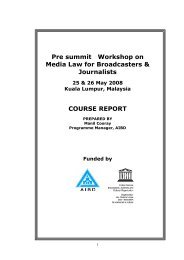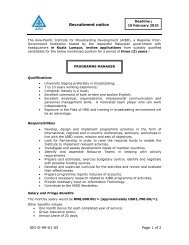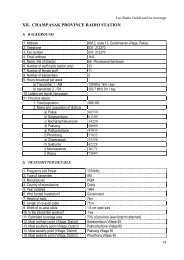Report Media for Children1.pdf - AIBD
Report Media for Children1.pdf - AIBD
Report Media for Children1.pdf - AIBD
Create successful ePaper yourself
Turn your PDF publications into a flip-book with our unique Google optimized e-Paper software.
elong, which is in many ways defined by<br />
global communication.<br />
Outlining five points of principle <strong>for</strong><br />
children’s media, she said media must<br />
above all have an educational goal and be<br />
trustworthy. Programme producers must be<br />
allowed to take risks by pushing<br />
boundaries, exploring new possibilities,<br />
raising fresh questions and challenging<br />
children to think and act. She emphasised<br />
the importance of story-telling and of using<br />
the opportunities presented by multi-media,<br />
multi-plat<strong>for</strong>m patterns that children take to<br />
so naturally.<br />
She also spoke briefly about the World<br />
Youth Digital Story-telling Exchange<br />
Project (WYDSTEP) aiming to enable<br />
children to tell their own stories, train them<br />
in new media, and encourage them to share<br />
ideas and stories across the globe. The<br />
project includes plans <strong>for</strong> a global digital<br />
archive/library that will help give young<br />
people a voice.<br />
Next Mr. Thomas Rump presented key<br />
findings of two studies conducted in<br />
Germany over the past few years, seeking<br />
in<strong>for</strong>mation from children on their own use<br />
of media. The figures revealed that<br />
children’s media consumption rose from<br />
346 minutes per day in 1980 to 502 minutes<br />
per day in 2000 and 600 minutes per day in<br />
2005. According to Mr. Rump, the gain is<br />
explained partly by their pattern of<br />
simultanously using two or more sources of<br />
media, which means that they are diverted<br />
and their attention levels are reduced.<br />
Also, he said, the emergence of more media<br />
<strong>for</strong>ms will translate into growth in time<br />
spent on media.<br />
The biggest gainer in terms of time share<br />
between 2000 and 2005 was the Internet,<br />
which rose from three to seven per cent,<br />
whereas TV’s share remained constant at<br />
37%, radio’s share went down slightly<br />
(from 41% to 37%) and the share of other<br />
audio went up by just one percentage point<br />
to eight per cent. With media use, too, the<br />
most remarkable growth was in computer<br />
usage: if in 1990 only seven per cent of all<br />
children used a PC at least once a week, by<br />
2003 the figure had risen to 61%.<br />
Similarly, while the Internet was not even<br />
on children’s horizon in 1990, it had<br />
established itself quite firmly by 2003.<br />
There was no substantial difference<br />
between age groups in their use of TV<br />
(ranging from 97% among 8-9 year-olds to<br />
100% among 10-11 year-olds). However,<br />
12-13 year-olds emerged as the top users of<br />
all the other media, including computers,<br />
with 10-11 year-olds coming close only in<br />
terms of radio; the biggest gap was in<br />
Internet usage, with the younger group 14<br />
percentage points behind the older group.<br />
Mr. Rump specially highlighted research<br />
findings relating to radio, which suggested<br />
that only about seven per cent of all<br />
children aged 6-13 tune into specific<br />
programmes, while 77% just tune in and<br />
listen to whatever is being broadcast at that<br />
time. Further, only 35% of all children tune<br />
in daily and 80% do not listen to radio in<br />
their own room (in other words, of their<br />
own volition). Most children in the 6-13<br />
age group (86%) seem to use radio<br />
primarily <strong>for</strong> music and, consequently<br />
perhaps, to prefer commercial radio stations<br />
to public broadcasters.<br />
According to Mr. Rump, while media use is<br />
likely to grow in the future, time budgets






